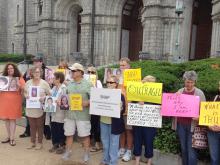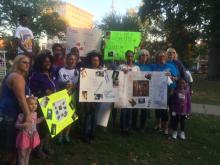Abuse

“The effort to keep the church from stopping this sort of thing is shocking,” she added. “It is about male power and male image, not people’s stories. The real trouble is they have defined their power as spiritual leadership and they don’t have a clue about spiritual life.”

“We’re really not talking about anything changing,” said Mary Ellen Kruger, chair of the five-member board of directors of SNAP. “Our everyday mission is the same: helping survivors, protecting kids through education, and exposing predators. So that’s not changed.”

At this time of year, we often see animals subjected to cruel holiday stunts, or treated as living props in our confusing pageantry.
Domino’s Japan recently announced it was canceling its ill-conceived plan to train reindeer to deliver pizza, following a PETA Asia campaign. And just this week, a man was charged with abusing a camel that was part of a hospital’s live Nativity scene in Pikeville, Ky.

Over the last few months, Bresha’s plight has gained national support as advocates call for her immediate release. Accused of killing her father after enduring a lifetime of abuse, prosecutors have threatened to charge Bresha as an adult, which could potentially leave her in prison for the rest of her life.
For me, Bresha’s story hits way too close to home.

These accusations suggest evidence of a coverup on the part of the Seattle Archdiocese, wrote KIRO7 reporter Dave Wagner, who first broke the story on his Facebook page.
But "the Seattle Archdiocese maintains it is trying to atone for the sins of the past."

The Association of Baptists for World Evangelism has released a 280-page report revealing how its leaders failed to stop a leading missionary surgeon from sexually abusing 22 women and girls.

It’s a story as familiar to small, neighborhood churches as it is to large megachurches, though those are the ones that grab headlines.

A Louisiana judge has ruled that a state law requiring clergy to report child abuse or other crimes learned in the confessional is unconstitutional because it infringes on religious liberty. At issue is a long-running case involving Rebecca Mayeaux, a 22-year-old who claims that when she was 14 she told the Rev. Jeff Bayhi, a Catholic priest, during confession that a church member was abusing her. Mayeaux claims Bayhi told her to “sweep it under the rug.”

Rape. Domestic Violence. Acid Burnings. Female Infanticide. Human Trafficking. Emotional Abuse. Sexual Harassment. Genital Mutilation.
These are just a few forms of sexual and gender-based violence (SGBV) that women and girls endure on a daily basis. But these assaults on the human spirit and sacred worth of women and girls will not have the last word.

What do you do when you want to balance the budget and don't know how to compromise? Well, if you're Congress, you raid $1.5 billion from a fund set up specifically for crime victims and hope no one notices.
The Victims of Crime Act fund, set up by Congress in 1984, is distributed to states to support local domestic violence shelters, rape crisis centers, and a variety of victim assistance programs for survivors of trauma and crime. The thing is, this is a self-sufficient federal fund — meaning that it doesn't come from taxpayer money but rather the fines and penalties imposed on criminals and offenders.

The wife of Saeed Abedini, the Iranian-American pastor imprisoned in Iran since September 2012, has had a difficult month.
First Naghmeh Abedini canceled all public appearances after telling supporters by email that her husband had abused her physically, emotionally, and sexually. Twelve days later, she released a statement saying she regretted her previous emails.
“I was under great psychological and emotional distress,” she said.

In every moment, we are every age we have ever been, according to psychologist Carl Rogers. For me, this means our bodies are like a bus riding down the highway of life, and the passengers are who we have been at every age. As we travel through life, some things we see, hear, and experience evoke feelings of great joy, love, and calm — or trigger tremendous anxiety, pain, and fear — from different past experiences.
When children are treated like they are not important, told they not smart enough or good enough, valued more for their accomplishments than for the unique individuals they are, treated like they only have value if they have money, or abused emotionally, physically, or sexually, the impact of those feelings never goes away. Those feelings continue to ride on the bus.
Because the child within us never goes away, the impacts of childhood abuse and neglect are long-term unless there is meaningful intervention.

“BLACK WOMEN AND GIRLS are killed by the police, too.” I can’t tell you how many times I’ve received a blank stare when I made this statement, even in activist spaces. Occasionally I’ll see a few affirmative nods, but overwhelmingly there is apathy. I leave with a sick feeling, wondering, “Where is the rage and protest for my sisters?” and “Who will fight for my life?”
In May, Black Lives Matter, Black Youth Project 100, and Ferguson Action came together for a national day of action for black women and girls. We wanted to shed light on the fact that black women and girls, in all our complexities, have been erased from the broader narrative of police terrorism and modern-day lynching in this country. Cities such as Oakland, Calif., New York, Philadelphia, Detroit, and Miami all participated in powerful acts of public resistance that involved reading the names of women who have been killed by police and using the hashtag #SayHerName as an awareness tool on social media.
Speaking our sisters’, daughters’, and mothers’ names at a vigil on a day set aside to acknowledge our humanity is powerful, because it says: When the world has forgotten Mya, Aiyana, Tanisha, Rekia (and so many others), we will not forget.

From 2001 through 2012, 6,410 women were murdered in the United States by an intimate partner using a gun. That is more than the total number of U.S. troops killed in action during the entirety of the Iraq and Afghanistan Wars combined.
Guns are used in fatal intimate partner violence more than any other weapon. Of all the women killed by intimate partners during 2001-2012, 55 percent were killed with guns.

EARLIER THIS year came a flurry of new horror stories about the abuses of human dignity that are, apparently, common in many of America’s college fraternities. First came the video from the University of Oklahoma in which a busload of “true gentlemen” of Sigma Alpha Epsilon are seen and heard spewing racist bile. Shortly thereafter the revelation that the Kappa Delta Rho chapter at Penn State had maintained a private Facebook page featuring nude photos of unconscious young women became national news.
The old saying “Once a frat boy, never a man” may be just another sweeping stereotype. But the evidence is mounting that many of the nation’s fraternity houses are the breeding ground for an exclusive culture of entitlement and impunity that their mostly white, upper-class members carry into their future roles in the elite circles of business and government.
It should be noted that when we talk about “fraternities,” we are really just talking about the historically all-white social organizations with Greek-letter names. Historically black fraternities have their own problems, especially with hazing, but they have experienced nothing like the epic bad behavior found among their paler brethren.

Runaway Radical is a heartbreaking story told with great courage and honesty. In it, the authors offer a much-needed critique of both fear-based, crime-and-punishment theology and unjust power dynamics which are sadly commonplace within Christian culture. It’s an important story, one which I hope will create space for others who have been hurt by the church to share their experiences without shame or fear of rejection.
But Runaway Radical struck me as an inappropriate title for a book whose subject matter was spiritual abuse and unhealthy striving, rather than any fundamental problem with the “radical” idea of taking Jesus’ teachings about wealth and sacrifice seriously.

In recently released Runaway Radical: A Young Man’s Reckless Journey to Save the World, Jonathan Hollingsworth and his mother, Amy Hollingsworth (best-selling author of The Simple Faith of Mister Rogers) tell the story of college-age Jonathan’s mission trip to the African country of Cameroon. After participating in a short-term mission trip to Honduras, Jonathan felt inspired to serve others in a more profound way. When he connected with a missions organization that promised him a year of exciting opportunities to serve in Africa — and he was able to raise the necessary funding — he seized hold of the opportunity with a vulnerable heart and a zeal for personal sacrifice.
After reading the above description, you might be surprised to learn that Runaway Radical is actually a story of spiritual abuse. But by the time Jonathan prepared to leave for his yearlong trip to Cameroon, his entire family — and his supporters — were groomed for abuse. They were groomed by ideas perpetuated by many people and many organizations, teachings many Christians would follow without much of a second thought. The first idea asserts that everything done in God’s name is good. The second idea works in companion with the first, declaring there is always more you can be doing, more you can be sacrificing, to prove your commitment to your God and to his mission.
When Jonathan traveled to Cameroon, not only did his host prevent him from serving in the ways he had hoped, his mission organization used him and his funding for their own selfish purposes with little regard for his health and well-being. During his time in Cameroon, Jonathan’s organization forbade him from developing relationships with locals whose behavior did not follow their stringent moral code, defined for him who the “real” Christians were, and denied him immediate access to medical care. Jonathan also learned that the leader of the organization lied to him about the status of the the supposed projects of which Jonathan was to be a part.
What began as Jonathan’s eager and well-intentioned trip slowly and painfully morphed into a constricted and disillusioning journey of physical, mental, emotional, and spiritual anguish.

Sitting in Prajwala's small conference room adjacent to a chaotic market, I asked Sunitha where the strength came from to charge ahead into danger, violence, and sometimes even rejection by the women Prajwala served. I don't remember her exact words - but the gist was that the strength came not from herself, but from faith in her own experience of God. Not a God owned by some religious denomination, but the real One. That One who never let Sunitha down when it was time to pay the staff, deal with the mob, handle corrupt police, or remain resolute in the face of failure.
I have been blessed and humbled to have met these three women and remain inspired by what they do, particularly their commitment to empowering other women and girls. Sunitha told me to not just show up and feel sorry. Send money if you are inclined, but most importantly, speak about sexual slavery and trafficking to everyone you know. Don't allow anyone to pretend it isn't going on in your own community. Only when all men are vocal about this and intolerant of any abuse of women will things improve.
I pray that I may develop a sliver of the courage Anna, Anna, and Sunitha model.

North America is home to an estimated 1.5 million trafficked persons alone. Many of these people are domestic workers—an industry with a growing worth of $8 billion in profits every year.
Many domestic workers in the United States are hard working people who enjoy their jobs and have fair working conditions. But the private and unregulated nature of the job does make these workers vulnerable to exploitation and sometimes a destination job for trafficked women.
This is the problem that authorities grapple with: how to regulate a global industry where workers are so open to exploitation and abuse.
Enter Convention 189—a document that creates international law preventing the trafficking and exploitation of domestic workers like Erwiana. This new international law deals with much of the complexity of the problem while still allowing domestic workers to earn a fair living and bargain for their conditions.
National governments have begun to sign on to Convention 189, but the U.S. and other larger countries are lagging behind in its support for tougher global protections for domestic workers.
For many, these new global protections can’t come fast enough. We know that the more countries like the U.S. sign onto Convention 189, the more robust the law will be and the better the protection for domestic workers.
Occasionally our governments need reminding that the plight of some of the most vulnerable must become a priority. Join me in calling on the United States to support global protections for domestic workers by ratifying Convention 189.

I HAD AN EXPERIENCE with a young man who was having difficulty in seminary, having difficulty with his wife. His wife was a flight attendant, so they had limited time together. He came pounding on my door one morning.
“I’ve got to talk to you,” he said, “because I want you to hear it from me before you hear it from somebody else. I don’t want you to put me out of school. Me and my wife are through.”
“Well, come in. Tell me, what’s going on.”
“Last night, we had a fight and she got upset and she told me that, even when she was there, I wasn’t.”
“What happened?”
“I had to show her,” he said. “I got my Bible and I showed her that I am about God’s work. God comes first and you, wife, come second.”
“What did she say?”
“She said, ‘You and your God can go to hell!’ You know I don’t need a woman like that in my life! I need somebody that’s going to support me in my ministry.”